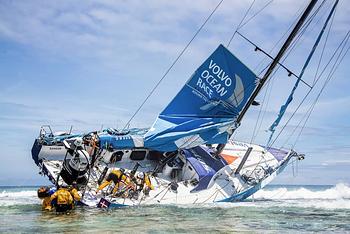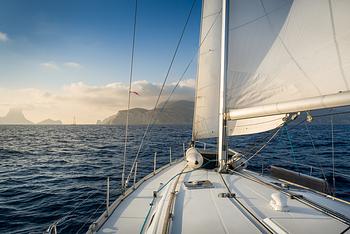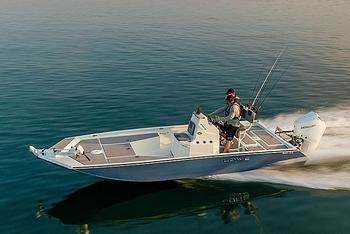If you’re thinking about buying a boat, you’ll probably have some idea of the places you’ll be using it. You might live inland near lakes or reservoirs, or prefer to cruise coastally. You might already own a boat that you use exclusively on lakes and rivers and are considering making the move to the ocean.
We get asked a lot what the differences between saltwater boats and freshwater boats are, so here we’re going to take a look and answer some of the most frequently asked questions.
Is There a Difference Between Freshwater and Saltwater Boats?
It can be daunting considering switching from what you know to something different, and that is often the case with boaters who have exclusively cruised in either freshwater or saltwater. But it doesn’t need to be that way with a bit of careful planning and most importantly meticulous maintenance. If you’re used to saltwater conditions, and the effects that salt can have on your boat and its systems, then you’ll likely find switching to freshwater easy. The other way around however, you’ll need to make a maintenance plan to ensure your boat doesn’t suffer corrosion. Essentially, freshwater doesn’t pose many problems for your boat in the same way that saltwater does. In fact, saltwater corrodes boats up to 10 times faster than freshwater.
But are freshwater boats and saltwater boats different?
In a way yes. Saltwater boats often have different systems to deal with salt corrosion, as can also have a different physical characteristics. These include:
Closed cooling system:
The engine cooling system on a boat designed for saltwater will protect the engine from the corrosive damage that salt causes. It essentially flushes the engine and systems to prevent a build-up of salt. If you use a boat that has been cruised in freshwater in saltwater, and it doesn’t have a cooling system, you will need to manually flush the system after every use to ensure it doesn’t get a build-up of corrosive salt.
Mercathode system:
Taking the protection of the engine against saltwater even further, some boats designed for saltwater will be equipped with a mercathode system. This is a galvanic corrosion protection system which uses electrical currents throughout the boat engine to protect against galvanic corrosion.
Hull Type:
There are many boats on the market that are equally suited to both types of cruising, and it will be a case of focusing on the maintenance and systems that will make the difference to switching from one to the other. Having said that, hull shape can make a big difference. Flat bottomed boats designed for the flat, calm, shallower waters of lakes and rivers won’t have the stability to handle waves and rougher seas. Some may be suitable to coastal cruising but not able to handle offshore conditions. Likewise, there are boats designed to handle ocean conditions, with deep hulls and large keels, may not be suited to launching or handling in shallow waters.
Best Boat Types for Saltwater

Best Boat Types for Freshwater

FAQs on saltwater boats vs freshwater boats
1. Can I use a saltwater boat in freshwater? Or a freshwater boat in saltwater?
The answer is sometimes. There are many boats on the market which are designed to handle varying conditions, from ocean waves, currents and salt to the more sedate conditions usually found on inland bodies of water. Transitioning from saltwater to freshwater is much easier for the reasons we’ve looked at above (essentially there is no need to change cooling systems), but it’s also possible the other way around with some extra maintenance. Hull type will play a role in both, with some flat-bottomed boats designed for the shallower freshwaters not stable enough for saltwater conditions. Likewise, deep hull ocean-going vessels might struggle with launching or navigating in shallow freshwater.
2. What are maintenance differences for saltwater and freshwater boats?
As we’ve seen, the effects of salt are the biggest difference when it comes to saltwater and freshwater boats. So if you’re not experienced with caring for your boat in an ocean environment you’ll want to ensure a strict maintenance plan to care for it.
You’ll want to:
-
Flush the engine with water after every use if your boat doesn’t have a cooling system
-
Have anti-fouling applied to the hull and have it cleaned periodically. Marine organisms can grow on the hull, especially in warmer waters, and this needs to be managed carefully.
-
Rinse you boat and trailers with fresh water thoroughly after every use
-
Check your boat, its systems and engine regularly for signs of corrosion and deal with it before it becomes a problem
3. Is there anything to look out for when keeping a boat in freshwater versus saltwater?
While we’ve talked about the corrosive effects of salt a lot, one issue that is more prominent in freshwater is the development of blisters on the hull. This is caused by the gel coat absorbing water and usually affects boats when they are around 5 to 10 years old. Boats that are trailered or taken out of the water during the winter months tend to suffer this far less than those that are kept in the water year round. Keep an eye on blisters and if they become large or numerous then the hull will likely need re-coating.
4. Do saltwater boats cost more than freshwater boats?
This question can be approached from two angles; one is the purchase price and the other the maintenance cost. With regards the purchase price then the extra cooling systems on saltwater boats can lead them to cost more. However used freshwater boats often keep their resale price better because buyers assume they’ll be in better condition than saltwater boats. While this isn’t necessarily true, and a well-maintained saltwater boat can be in as good or better condition as a freshwater one.
When it comes to maintenance, saltwater boats are going to cost more to maintain than freshwater. In fact it is estimated they will cost two to three times more and up to 10% of the value of the boat, with everything from the propellers to the hull, engine and decks to maintain. It is also worth keeping in mind that insurance might be more expensive on a saltwater boat because of both the additional risks of sailing in the ocean as well as the effects of salt on your boat.
Whether you decide to buy a freshwater or saltwater boat or are considering switching your current boat from one to another then head to Rightboat.com for the biggest selection of affordable used boats on the market, as well as high end used boats and new boats. Alternatively, with the knowledge and confidence to make the transition from rivers and lakes to the seas, you can adapt your boat and enjoy a whole new array of adventures.



